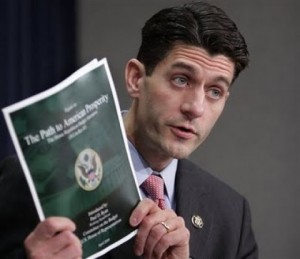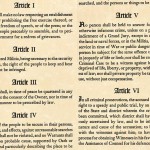 While Rep. Paul Ryan is trying now to distance himself from his long-time devotion to the teachings of Ayn Rand, there is plenty of documentation to prove it, as Mark Shea said in May. At issue is not whether he had some extreme views in his youth. Nor is it a question of whether someone in the political sphere can change their mind. I detest how any change of heart is attacked as flip-flopping. But what I am looking at here are the core values that guide the person. In 2009, Ryan said, in his own congressional campaign video available here, unless they take it down:
While Rep. Paul Ryan is trying now to distance himself from his long-time devotion to the teachings of Ayn Rand, there is plenty of documentation to prove it, as Mark Shea said in May. At issue is not whether he had some extreme views in his youth. Nor is it a question of whether someone in the political sphere can change their mind. I detest how any change of heart is attacked as flip-flopping. But what I am looking at here are the core values that guide the person. In 2009, Ryan said, in his own congressional campaign video available here, unless they take it down:
Ayn Rand, more than anybody else, did a fantastic job explaining the morality of capitalism, the morality of individualism, and that, to me, is what matters most.
In case you haven’t read Ayn Rand, here is her “morality of capitalism”: survival of the fittest and radical individualism. In Rand’s world, groups are always weak. Leaders of groups are always manipulators. And religion, specifically, is held up as a foolish enterprise designed to pacify people, so they don’t shine out as the glorious individuals they could be. There is not one shred, not one hint, of people being authentically motivated by serving others or the common good. It couldn’t be more starkly presented than in The Fountainhead, where the Enemy is a religiously-minded person, someone who almost entered the ministry but shied away even from that level of personal excellence, whose goal in life is to sabotage individual greatness. The hero, in contrast, is an arrogant, truly despicable genius, who is driven only by personal achievement, stepping on other men and in one case date-raping a woman (though Rand defended the portrayal saying it was clear she wanted it.)
I read The Fountainhead long ago out of curiosity because some friends had pointed to it as a major influence. I was horrified throughout. I was horrified at the celebration of aggressive dominance and at the ridiculing of faith. While there were flashes of insight here and there into some of the pitfalls of collectivism, overall the book is a celebration of amorality. Or, to be more precise, as 19th century occultist Alistair Crowley said: “Do what thou wilt shall be the whole of the Law.”
The anti-religion fiscal conservatives have been quiet for a few generations, but I know them well. My dad was one. He believed in science, progress and individual achievement, and hated communism and religion equally. His work was on the predecessors of magnet schools, a wonderful endeavor but fitting with his belief in enabling individual achievement. (These programs gave a laudable opportunity to those kids in an inner city school with the aptitude to excel, but left behind the average and below-average kids.)
I think it’s wonderful that Ryan now cites teachers within his Catholic faith as influences. But the fact remains that Rand’s anti-community radically individualistic philosophy seems to remain at the base of his policies. There’s one thing Catholic conservative Paul Ryan does if nothing else: he unites the U.S. bishops and nuns in opposition.
In choosing Rep. Paul Ryan as his running mate and calling him the “intellectual leader” of the Republican Party, Mitt Romney has:
- doubled down on the 1%, encouraging the fiscal conservative side which wasn’t going to vote for Obama anyway while turning off politically aware centrists to whom Ryan has been the figurehead of the slash-the-safety-net crowd;
- moved the debate from the potentially winnable attack on the Affordable Care Act to an assault on Social Security and Medicare;
- completed his ticket with someone else many Christians don’t even consider Christian;
- chosen a Catholic whose budget has been denounced by the U.S. bishops as unchristian.
Seems like the worst of all worlds: push centrists further away, don’t gain many conservatives, and possibly lose even more Catholics. I realize that for fiscal conservatives Ryan is a bit of a hero for how bold his proposals have been, but only insiders have even heard his name. Most Americans will be introduced to him by the press as an attacker of entitlements.
So, either this signals that Romney himself will also be taking a much harder line on economic conservatism going forward, which would in fact draw a strong contrast by putting Romney firmly with those who want to roll back not just health care but the whole safety net, or he’s hoping that putting Ryan on the ticket will placate conservatives, allowing him to tack centrist. Either way, I don’t think this will help him in total numbers.
Ayn Rand was not anti-religious in the popular form of “spiritual but not religious”; she believed that any impulse to care about other people was either weak or disingenuous. Her version of economics and all of life celebrated only individual dominance as the driving force. I don’t think Paul Ryan — who says he got into politics because of reading Rand — believes this, but he like a large portion of the conservative movement has not resolved the inherent disconnect between their pure free market policies, based on this invisible hand mentality, and their professed religious values. In embracing Ayn Rand so wholeheartedly while insisting he’s also a devout Christian, Paul Ryan embodies this disconnect.
This gives President Obama the opportunity to revisit the discussion of whether it is more consistent with Christian values to protect free markets or to help those in need. When framed starkly like that, it’s a loser for the Republicans. The presence of Paul Ryan on the ticket make it that stark. For those interested in drawing out moral issues in the presidential race, this just made things a lot more interesting.












